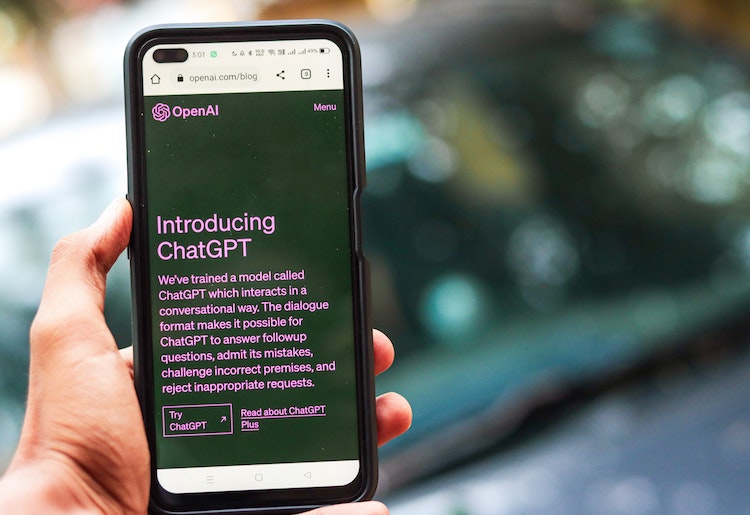Search engine optimization (SEO) is a critical necessity for any business to stay relevant and visible to prospective customers and clients. Immediately following the launch of ChatGPT, digital marketing agencies began identifying ways to leverage this tool for various SEO tactics. Developed by a startup company called OpenAI, ChatGPT can now successfully create responses to questions, develop lists, write articles, and edit lines of computer code.
More importantly, ChatGPT continues to integrate itself into professional work environments, especially the digital marketing industry. Luckily, marketing professionals can use ChatGPT to help improve SEO efforts, ideate digital content, display lists of keywords, and generate backlinks to propel your website to the No.1 spot on Google! Are you struggling to boost your website’s visibility or want to learn how ChatGPT could be a leverage for your company? Continue reading to learn how ChatGPT is useful for SEO purposes.
What is SEO & How Does it Relate to ChatGPT?
SEO describes comprehensive practices for optimizing a website or product listing’s relevance to rank higher on search engines. A higher search ranking makes it easier for customers to find a desired product or website. Whether people research the products you sell, the services you provide, or wish to learn more about the brand, your website should appear in the Search Engine Result Pages (SERPs) for queries using targeted keywords.
For example, if someone is looking to develop their digital marketing company to rank higher and reach different customers, you can type into ChatGPT and get a list of 20 possible keywords.
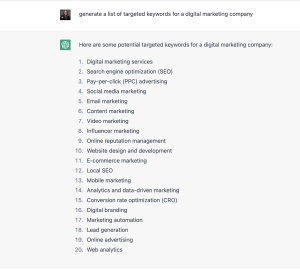 The goal of using SEO is to help customers find your website organically, rather than rely on paid promotion. Some examples of other factors that can improve a website’s SEO include Title Tags, H1 & H2 Headers, and Backlinks. Let’s explore each element in greater detail.
The goal of using SEO is to help customers find your website organically, rather than rely on paid promotion. Some examples of other factors that can improve a website’s SEO include Title Tags, H1 & H2 Headers, and Backlinks. Let’s explore each element in greater detail.
1) Title Tags
These refer to an element of HTML that allows you to title a website. Using proper keywords in your title tags is essential to gaining an organic ranking and finding when consumers are searching for your business or product. For example, if you own a roofing company, people may search: “roofers near me” and with the word “roofer” being used in a title tag and the search engine, your company’s website will appear.
2) H1 & H2 Headers
These markers contain your target keywords because it is the title of your blog post or article. Remember, this header is the first one to appear when someone is searching for a specific post and yours appears. H2 headers are the subheadings within the article that ultimately break up large blocks of text within sections.
3) Backlinks
These elements will boost your existing SEO rankings because the links will highlight your content as valuable and authoritative. By building multiple backlinks, your website can rank higher.
How Marketing Professionals Can Utilize ChatGPT for SEO
The days of brainstorming the right keywords, creating distinct types of content, and generating title tags are becoming outdated. With ChatGPT in your digital toolkit, you can create ideas and outlines for social media and blog posts to boost your client’s website or even your company’s site. Marketing professionals can also use ChatGPT to rephrase any existing content to prevent any duplication penalties, as well as insert additional keyword-rich copy. ChatGPT can help marketing professionals increase their website visibility and SEO improvement with the right keywords.
Further, you can use ChatGPT to list key statistics as well as generate ad copy variations for A/B testing. However, many businesses are concerned about using ChatGPT because the information it produces has been inaccurate, cannot be publicly safeguarded, or in some cases, plagiarized. Keeping all these facts in mind, here’s how some marketing professionals use ChatGPT to improve their SEO.
Compose SEO Meta Descriptions
ChatGPT can pen meta descriptions and meta tags for any page on a website. Meta descriptions refer to an HTML element that provides a summary of a webpage. Additionally, a page’s meta description tag will display as part of the search snippet in Google SERPs. With a clearer understanding of the page’s contents, viewers may feel more inclined to click through to the page.
To obtain this information, enter a topic or keyword into the textbox within ChatGPT, to get a developed meta description. For example, if you own a bookstore and need a meta description for a landing page that welcomes potential customers, ChatGPT can produce the following copy.

Then the chatbot will write the meta description for you using the best keywords for SEO purposes. Keep in mind that you need to edit what this AI (Artificial Intelligence) produces because of the possibility of it giving you incorrect information. Before publishing the content on the internet, make sure you review and edit the copy developed from ChatGPT.
Create Long-Form SEO Content
Did you know ChatGPT can produce content such as full blog posts, writing website pages (also referred to as landing pages), product descriptions, and ad headlines? Marketers can type in their topic or keyword into ChatGPT and mention if they want a blog post or article made.
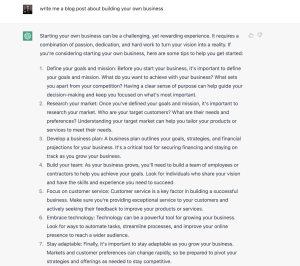
Remember, ChatGPT needs as much information as possible to plan a response. So, be as specific as possible with your prompt. The language model will compose a blog post based on your topic, but again, it will need revisions and fact-checking because you don’t want to release incorrect information. ChatGPT is not connected to the internet, which prevents it from learning real-time information.
At the time this article was written, ChatGPT only has knowledge of the world and events after 2021 because the developers had programmed this information into ChatGPT. With the possibility of ChatGPT producing plagiarized and incorrect material, marketing professionals must fact-check and revise the produced copy. By using ChatGPT for content creation, you save time on curating ideas.
Improve Customers’ Search Experience
It’s difficult for marketers to develop fresh and innovative ideas for new content about a complex topic; especially for content that aligns with a customer’s original search intent. ChatGPT can generate brainstorming ideas for niche content by analyzing any relevant keywords, related topics, and trending topics. Marketers can get inspiration for topics for blog posts, social media posts, and any other content that focuses on SEO optimization. Developing ideas for various content is getting easier by using ChatGPT!
Produce SEO Keyword Lists
Another way marketing professionals can optimize their SEO performance is by asking ChatGPT to develop a list of keywords. Keywords are common phrases or words that customers use on search engine websites, which allow for your business listing and website to appear. For example, if you type “list of keywords for roofers,” ChatGPT will produce an extensive list of broad keywords to use.
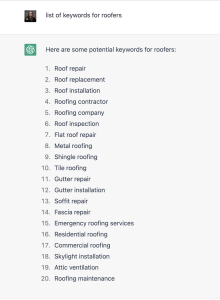
It’s important to use keywords on your website because using similar words or phrases that potential customers allow your website to speak the same language as potential customers. Some other keywords that ChatGPT can identify, and produce are long-tail keywords, competitors’ terms, related and synonym keywords, and identifying questions. Improve your SEO standing by understanding and using important keywords.
Generate SEO Title Tags
All writers can agree that producing titles for blog posts is an arduous task. With ChatGPT, you can input your topic and the AI model will produce a list of SEO-friendly titles.
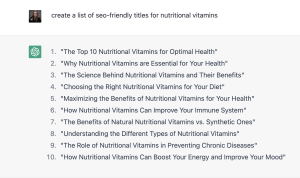
These generated titles can create titles that will pique a reader’s interest while including relevant keywords. Additionally, you can phrase your titles to sound and read like phrases that are possibly used by searchers. By using a catchy title produced by ChatGPT, the chatbot can lead to bringing more traffic to your website and a higher search engine ranking. Consider using ChatGPT to create a catchy and SEO-friendly title for your product, article, or blog post.
Let ChatGPT Help Optimize Your SEO!
ChatGPT is a powerful tool that can help marketing professionals and businesses improve their SEO standing. The AI chatbot can create website content, make a strong SEO title, compose a keyword list, and write meta descriptions. Let ChatGPT be your guide when developing ideas!
Ready to optimize your website’s standing with SEO practices? The writing and marketing experts at Premiere Creative are pinpointing the best tactics to use ChatGPT for all your SEO needs! Dial (973) 346-8100 to connect with our team.

